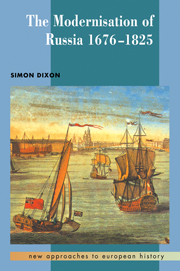4 - Society
Published online by Cambridge University Press: 05 June 2012
Summary
Social policy
Russian rulers' ambitions to regulate society grew in inverse proportion to their knowledge of it. Setting aside the Commerce Commission's investigation of the merchantry in the 1760s, it was not until the 1840s, when positivist-inspired officials undertook detailed empirical studies, that the government began to understand how rural society worked. Even then, there were only glimmers of comprehension. Local government was still less well informed. Only after the revolution of 1905–7 did ministers begin to respond to what they discovered when designing social reform. By then it was probably too late.
Undaunted, Russia's eighteenth-century rulers assumed that social policy should derive not from experience but from first principles. They therefore strove to regulate every aspect of people's lives, not so much for their own individual benefit as for the greater good of the state as a whole. This regulation they called ‘police’ (Polizey). Since they also needed to extract revenue from the population, we must consider the dual impact on Russian society of fiscal change (representing the government's immediate requirements) and social engineering (the expression of longer-term aims). Neither should blind us to the fact that social change remained in many ways haphazard, often occurring as the partially or wholly unintended consequence of measures designed to achieve quite different results.
- Type
- Chapter
- Information
- The Modernisation of Russia, 1676–1825 , pp. 80 - 117Publisher: Cambridge University PressPrint publication year: 1999

